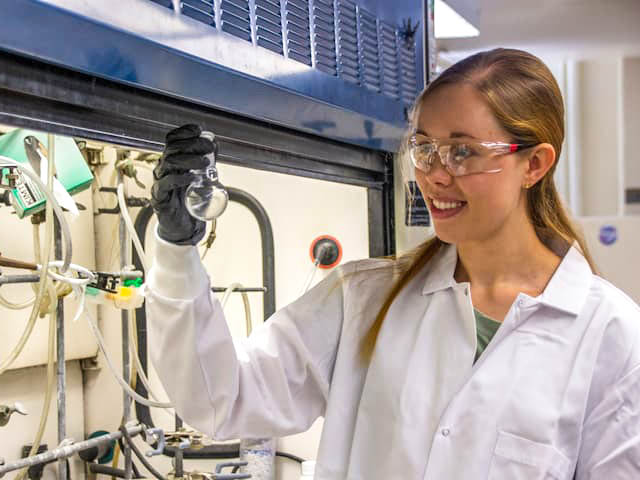
Chemistry and biochemistry alumna, Sydney Bottcher '22 achieved a lot during her time at Samford. She was a Howard College of Arts and Sciences (HCAS) Ambassador, a John Howard Scholar, a peer tutor and the president of the Chemistry Club. She also co-authored multiple publications and even had the opportunity to participate in a summer research program in Knoxville, Tennessee. However, she says nothing beats her becoming a Barry Goldwater Scholar in 2021.
"I am extremely honored to have accomplished so much during my time at Samford," Bottcher said. "Receiving the Barry Goldwater Scholarship, a national award for future STEM research leaders was one of my greatest achievements, and it would not have been possible without the support and encouragement of my Samford faculty."
Bottcher credits the Department of Chemistry and Biochemistry for playing an integral role in her success. She participated in their research program for seven semesters under the supervision of Chemistry Professor Dale Wilger.
"I try to approach every interaction with a student as an opportunity to teach,” Wilger said. “I also try to make sure that I have good personal relationships with my students. Understanding their motivations helps a lot.”
"I found Samford’s research program to be an extremely rewarding experience," Bottcher said. "The opportunity to have direct mentorship from a faculty member is not common at most universities, and the relationships I formed with faculty have been invaluable."
During her freshman year, Bottcher met with faculty to determine a research project that would be a good fit for her. Wilger, who studies transition metal catalysis in organic reactions, ultimately won her over.
"I chose to work with Professor Wilger because I was interested in learning how to synthesize new carbon-containing compounds," Bottcher said. "Initially, I was particularly drawn to organic synthesis due to the pharmaceutical applications, as many medicinal compounds are made using catalytic methods similar to those investigated by the Wilger Group."
In the research program, Bottcher developed several new and useful reactions using nickel catalysts synthesized in Samford's labs.
"Nickel is of particular interest as a transition metal catalyst because it is cheaper, more abundant and less toxic than commonly used palladium," Bottcher said. "We hope these reactions can be used in the synthesis of new biologically relevant organic compounds."
Producing these results took a lot of patience and willingness to adapt. Something Bottcher said she learned while under Wilger's wing.
"Experiments rarely give the results we expect," Bottcher said. "My faculty taught me how to navigate obstacles in my projects and develop new strategies when the data did not align with our initial hypothesis."
Bottcher said the experience also trained her in essential laboratory techniques and gave her the opportunity to communicate her research in peer-reviewed journals and academic conferences, both of which she said is essential for a career as a synthetic organic chemist and researcher.
"Professor Wilger also gave me advice about graduate school, different career options and further research opportunities that might help achieve my goals," Bottcher said.
Fast forward to 2023, and Bottcher is already on the path to pursuing her dream of becoming a chemistry professor. She is currently studying for her Ph.D. in chemistry at the California Institute of Technology in Pasadena, California.
"When I entered Samford as a freshman, I had no idea how many incredible opportunities would arise along my undergraduate journey," Bottcher said. "I believe the research focus of Samford’s Department of Chemistry and Biochemistry and HCAS overall is instrumental in the success of its students."
“Sydney was an amazing research student,” Wilger said. “She had an uncanny ability to think about and understand chemistry. Teaching Syndey was a great experience for me because she really enjoyed both learning and the process of science. I’ve never had any doubt that Sydney would be an exceptional scientist someday.”
Learn more about the Department of Chemistry and Biochemistry's research program.
Support the next generation of scientists with a donation.
